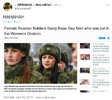The Ukraine war ‘bubble’ is deflating as the U.S. and Europe reach the bottom of the arms ‘inventory barrel’.
Historic shifts in world politics happen very
slowly. That was not the case however, when the U.S. first stepped onto the world stage. It happened quite suddenly in 1898 – with the invasion of Cuba: Old Europe watched with palpable anxiety …
The Manchester Guardian, at the time, reported that nearly every American had come to embrace this new expansionist zeitgeist. The few critics were “simply laughed at for their pains”.
The Frankfurter Zeitung warned against “the disastrous consequences of their exuberance” but realized that Americans would not listen.
In 1845, an unsigned article already had given birth to the slogan ‘Manifest Destiny’ – a claim that America had a destiny to expand, and to occupy others’ lands. Sheldon Richman, in
America’s Counter-Revolution, wrote that this latter vision clearly had ‘Empire on its Mind’.
This ‘Destiny’ ethos marked the turning point away from the former decentralization dynamic, and the start of the American impulse towards an imperial totalising outreach which succeeded it. (Not all, of course, were on board – the early U.S. conservative ethos was Burkean: i.e., suspicious of foreign entanglements).
Today, the picture could not be more different. Doubts and misgivings are everywhere; the drive and confidence of ‘Empire’ has faded. The U.S. apes more the exhausted Austro-Hungarian Empire of the pre-WW1 era – dragging an array of allied nations into a conflict that – at that time – turned into WW1. Now, it is western Europe that has been dragged into another European war – by default – owing to their alliance/ allegiance with Washington.
Then, as today, all states disastrously underestimated the length and severity of the conflict – and misread the nature
and significance of events.
Today’s war (against Russia) is framed in the West in a childish-moral trope (which nonetheless seems to work for an anaesthetised public) – that of WWII: Every rival is another Hitler, any reflective comment, another Neville Chamberlain example of appeasement. A tyrant lusts for European land and domination, and the only question is whether the good and just can muster the resolve to defeat this evil ambition.
This simplistic meme plainly is intended to obfuscate from their electorates the significance of the underlying dynamics at work: Not only is a major political cycle in transition, but this is occurring precisely at a moment when the western hyper-financialised ‘business-model’ is cracking. Put simply: the narrative obfuscation (“we are winning”) hides risks (both political and economic) whose gravity, western leaders seem unable (or unwilling) to grasp.
The U.S. – like pre-war Austria–Hungary – is slowly falling apart. That cannot any more be fudged. Washington is haemorrhaging control over events and making strategic mistakes. A certain class in the western ruling élite however, seems stuck in a reading of history. An interpretation that sees war as restoring the health of the state: that
any conflict – any
us vs them, whether real or abstract (such as war on poverty, drugs, the virus, etc.) – feeds centralisation and strengthens the totalising Leviathan. Indeed, even conceptualised as an internal ‘
us versus the enemy within’ war, this too is seen as consolidating the Leviathan.
This is the lesson that the élite claims it has learned from the modern state. In one sense however, this politics has become its own bubble of abstract narratives: a centralising, totalising bubble. One however, that is beginning to burst.
The western Ruling Classes do not understand – that is to say, they
do not want to understand – the ‘straws in the wind’, that are blowing in another direction – for example, the recent Samarkand SCO summit. Put simply: The Leviathan current has run its course; that’s it. History is moving in a different direction, and western leaders pretend not to notice.
This key shift was summarised succinctly by the Indian Foreign Minister recently, when accosted by a European demanding to know whether, or not, he supported Ukraine – that is, faced by the standard western binary: the ‘
with us or against us’ meme – the Indian diplomat riposted simply that it was high time that Europeans stopped thinking that ‘their wars’ were the globe’s wars: ‘We don’t have a side:
We are our own side’, he replied.
In other words, western ‘interests’ do not necessarily ‘translate’ into becoming the mandated interests of the non-western world. The non-western world is its ‘own side’. These states insist on living to a framework drawn from their own past historical experience; on creating political structures shaped towards their own civilisation and their own interests, and on economies adjusted to the grain of their own social framing.
This is the significance of Samarkand: Multipolarism. It refutes the western presumption of exceptional ‘entitlement’: Expecting others to put their interests behind those of the West. Above all, it is a current emphasising sovereignty and self-determination.
Plainly, such sentiments cannot be said to be anti-western. Yet the binary pre-disposition in the West is so deeply entrenched that few ‘get it’ (and those who do, don’t like it).
This is the primary way that the significance of today’s European crisis is misunderstood politically: The long historical cycle is reversing from centralisation, back toward de-centralisation (states being their ‘own side’). On the other side, there is the U.S. – internally divided; beset by crisis; intimating weakness; and consequently lashing out at all around in order to cling to its original expansionist roots.
Secondly, the war’s nature is misconceived in the West by being seen solely through the lens of the Ukraine conflict. The latter is but one small episode in the ‘long war’ waged by Europeans and Anglo-Saxons against Russia. This, in itself, has caused old revanchist ghosts of Europe to re-awaken – a fact that both aggravates tensions, and complicates any eventual resolution of the crisis.
One egregious misunderstanding and neglect, however, concerns the nature of politics and the role played by fossil fuels. Energy is in fact at the heart of this. How could the current Ruling Class in Washington ‘forget’ that the Western real economy is
a physics-based network system, powered by energy? Modernity is contingent on fossil fuels. A smooth transition to green energy over time, therefore is too, largely dependent on the continued availability of plentiful, cheap fossil fuel. Without energy of the right kinds, jobs disappear, and the total quantity of goods and services produced falls steeply.
Yet, western leaders
cast this basic understanding to the wind. Of what were they thinking when advocating that Europe should sanction cheap Russian energy, and rely on expensive American LNG instead? On reasserting a “rules-based” hegemony? On “European values”? Was this properly thought through?
And, in a further act of energy-linked folly, the Biden Administration now has alienated Saudi Arabia and the OPEC producers. OPEC is a cartel that attempts to manage production and demand through setting the price of oil. Did Team Biden forget that oil and gas – in a real way – are the very essence of geo-politics? The price, flow and routing of energy is at bottom, the principal ‘currency’ of global politics.
Yet, the G7 decided to strip Saudi Arabia of its rôle. It proposed instead a ‘buyers cartel of western states’ that would set the price of oil (and at Mario Draghi’s suggestion) extend a price cap to gas, too. Simply said: This was to take a hammer to Saudi Arabia’s ‘business model’ and collapse the main function of OPEC – now strengthened as OPEC+.
Not content with doing that, the Biden Administration took to selling one million barrels per day from the strategic reserves that further undermined the Saudi business model, whilst additionally seeking to drive crude prices lower through market manipulation.
Was Saudi Arabia expected to surrender OPEC’s hard won, price-setting role to the G7? Why should it? Is it justified on grounds that Biden’s party faces challenging midterm elections in November?
This is exactly what states were railing against at the Samarkand Summit – the western sense of entitlement. That, of course, Mohammad bin Salman must defer to Biden’s upcoming election prospects, and smile as his geo-political asset is stripped away.
Instead, it has evoked outright defiance. A former Indian Ambassador, MK Bhadrakumar,
writes:
This is the old Imperial ‘sin’. Expecting, and insisting on deference, whilst transmitting inherent weakness. Washington and its allies are trying to compel servility on all fronts. Yet the bellicose rhetoric is backfiring – states progressively have lost their trepidation
vis á vis Washington.
Thus, U.S. threats increasingly inspire not deference – but defiance. The problem is that the web of
‘us and them’ binary war narratives has become increasingly artificial and implausible – and consequently, near impossible for the West to keep stitched together.
This global trend toward defiance may ultimately prove to be the watershed – far surpassing any Ukraine war outcome – to a changed global order. Particularly, as Biden has picked a delicate moment to wage war on oil producers. So, we have three distinct bubbles that seem set to burst in tandem, creating a very ‘imperfect’ storm that may engulf what remains of western ‘strength’.
Here is the point: Not only is a political super-cycle transitioning, but bubbles are bursting on all fronts:
The Ukraine war ‘bubble’ is deflating as
the U.S. and
Europe reach the bottom of the arms ‘inventory barrel’; as Kiev’s finances tank and as its forces reel from heavy losses. Kiev and NATO face rather, the daunting prospect of a major Russian offensive maybe shortly – perhaps in early November.
The second bursting bubble is that of Europe’s ‘business model’. Much of EU industry simply is now uncompetitive, having ‘lost’ cheap Russian gas and oil. Simply put: the cost of energy is bankrupting Europe’s industry.
The third is the biggest of all: It is the ‘zero inflation–zero interest rate/QE’ bubble that has begun to burst. It is huge. And strategically, the Gulf represents the last pool of genuine ‘liquidity’ that historically has been a reliable purchaser and
holder of U.S. Treasuries.
More significantly, this decades-long hyper financialisation has begun to
unwind, as interest rates spike. What we are seeing in the UK is but a ‘canary in the mineshaft’: Many funds are highly leveraged again (as pre-2008) and exposed to derivatives using dazzling maths to pretend above-benchmark returns can be created risk-free from thin air again (as pre-2008). This always ends badly. All this high risk, unhedged leverage will need to be unwound at some point.
And just at this very moment, Biden elects to go to war with those Gulf energy producer states who almost uniquely hold the credibility of U.S. Treasury bonds in the palm of their hands. Washington exudes no apparent awareness of the gravity of
combined events – nor of any need to tread carefully.
 Sorry for adding noise to the thread.
Sorry for adding noise to the thread.







 And that's why you can see how people again and again politely point it out to you.
And that's why you can see how people again and again politely point it out to you.



